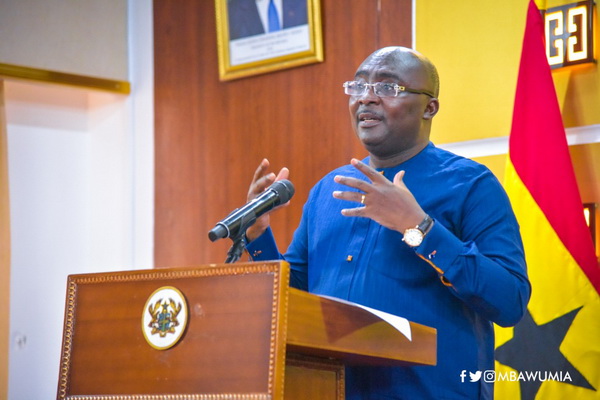Corruption prevention measures implemented by the Internal Audit Agency (IAA) in 2020 saved the country GH¢387 million.
The measures included tackling weak control systems and injecting discipline in the management of public funds.
The Vice-President, Dr Mahamudu Bawumia, who made this known when he swore in members of the IAA Board at the Jubilee House last Friday, commended the agency for protecting the public purse.
He said in addition to saving the country millions of cedis through the work of the agency, audit committees and internal audit units across the country, audit infractions reported in the 2020 Auditor-General’s Report reduced by 32 per cent for ministries, departments and agencies (MDAs), 34 per cent for metropolitan, municipal and district assemblies (MMDAs), 92 per cent for technical universities and 38 per cent for the District Assemblies Common Fund (DACF) and other statutory funds.
The IAA Board, which is chaired by Mr Joseph B. Winful, has Dr Eric O. Osae, Mr Samuel Danquah Arkhurst, Mr Frank A. Raji, Dr Mrs Janet Ampadu Fofie, Mr Fiifi Kwakye, Madam Edith Pinamang, Professor Kwame A. Frimpong and Mr Christian Sottie as members.
Protecting national purse
Dr Bawumia said in fulfilment of the pledge by the Akufo-Addo administration to protect the national purse, it had made significant successes, with anti-corruption institutions, of which the IAA was part, receiving significant increases in their budgetary support.
He said the government had initiated a process to repeal the Internal Audit Agency Act 2003 (Act 658) to restructure public sector internal auditing, with the goal to convert the agency into a service, rationalise the conditions of service, and move public sector internal auditing from conventional auditing to a risk-based auditing system.
Digitisation
The Vice-President explained that as part of the digitalisation agenda, the IAA now had a vibrant website which had facilitated the submission of quarterly internal audit reports, without walking to the agency’s office.
He added that with support from the European Union (EU), the IAA was being supported to develop an Audit Management Information System (AMIS) which would help automate the conduct of public sector internal auditing.
He commended the agency for the guidance in building risk management structures in public institutions to develop their capacity to minimise risks exposed by those institutions.
Dr Bawumia indicated that the further training of 892 management members and internal auditors in risk management, in line with the Public Financial Management Act, was evidence of the critical role the agency played in sustaining sound control systems in public institutions.
He saluted the IAA for establishing 553 audit committees across the country to help strengthen the fight against corruption, noting: “If we can win the fight against corruption, a lot depends on internal auditors and audit committees.”
Name and shame
Dr Bawumia urged the board to continue to work to reduce audit infractions reported by the Auditor-General, just as happened between 2019 and 2020 for MDAs, MMDAs, the DACF and other statutory funds.
“The naming and shaming of institutions which failed to submit their audit work plans and reports for 2020/2021 also caught my attention and I encourage the new board to ensure that defaulting institutions comply with the internal requirements under Ghana’s PFM Act,” he added.
He was of the conviction that if internal auditors did their work well, external auditors might have nothing to report on during the annual audits.
“I will, therefore, task the board to ensure high performance of internal auditors to justify the need for additional resourcing of internal audit activities across the country,” the Vice-President said.
Board pledge
Speaking on behalf of the board, Dr Ampadu Fofie said the agency was repositioning itself as an important corruption prevention institution through proactive advisory and assurance services.
She said the vision to protect the public purse required Ghanaians to optimise the use of national resources and protect the country from loss through leakages, fraud, irregularities, misapplication and negligence.
Source: Graphic Online





